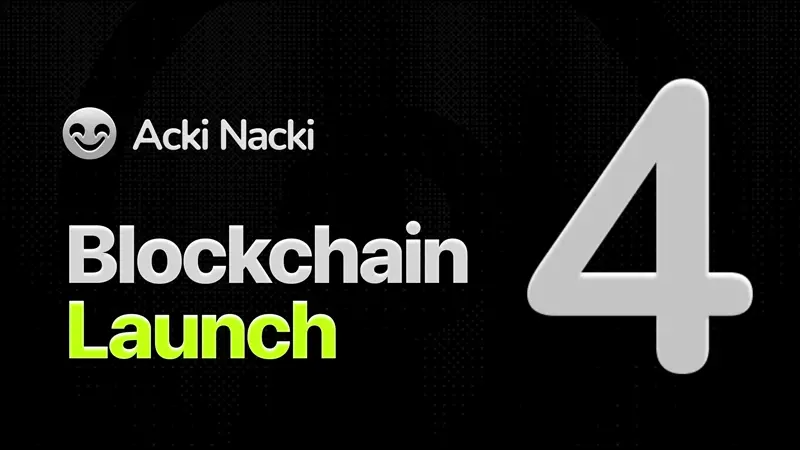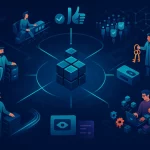It starts with a question, not of “if,” but of “how soon?”
What if billions of smartphones, idle in your pocket or charging beside your bed, are unknowingly participating in something bigger than any single user, app, or protocol? What if these devices are forming the early architecture of a global AI-mind, not in a lab, but on-chain?
Welcome to the idea of decentralized consciousness, where mobile users play a role not unlike neurons firing in a giant, distributed brain.
And the kicker? This isn’t science fiction. It’s already being built.
👀 The Big Shift: From Passive Users to Active Validators
Let’s unpack this.
Most of us think of blockchains as static things, ledgers, tokens, smart contracts. We hear about Proof of Stake, NFTs, DAOs, yadda yadda. But beneath the crypto hype, something more primal is stirring. A new model of computation is evolving, one that doesn’t live in a server farm but in you, me, and everyone with a phone.
Acki Nacki, a new blockchain protocol with an oddly playful name and a brutally serious architecture, introduces the concept of Mobile Verifiers, regular users who don’t mine, don’t stake big sums, and don’t need special hardware. Yet they can still participate in securing the network, by validating specific parts of it probabilistically.
That’s right: your mobile device, without doing any heavy lifting, becomes a trust anchor.
🕸️ The Network as a Brain
Think of it like this:
-
Block Keepers in Acki Nacki are like the spine and core processors, validating, producing blocks.
-
Mobile Verifiers are the sensory system, billions of tiny touchpoints, each checking, attesting, and confirming subtle bits of information.
-
Together, they form a living, breathing consensus, one that is aware, adaptive, and inherently more secure the more users engage.
Now, apply this model globally. Imagine 3 billion mobile phones, each occasionally verifying a small sliver of data, unpredictably, across time and geography. This randomness, this human-as-device interaction, creates something centralized AI could never replicate:
Chaotic harmony.
Where traditional AI is about control and logic, decentralized intelligence is about trust through unpredictability.
🔐 Why It Matters (and Why It’s Wild)
Traditional blockchain validation is exclusionary. You either run expensive hardware, or delegate to someone who does. That’s a bottleneck.
Acki Nacki flips this model by introducing a reward structure based on participation, game theory, and reputation, not raw stake. Mobile Verifiers don’t need to solve math puzzles or hold thousands of tokens. Instead, they:
-
Validate occasional transactions or account subsets,
-
Compete in reputation games to earn “boosts,”
-
Help secure the network against targeted attacks.
This doesn’t just decentralize the validator set, it democratizes sentience. It lets everyone in.
🤖 So… AI?
Now here’s where it gets spicy.
Artificial intelligence today is centralized. It lives in data centers, trained on mountains of scraped content, governed by a few giants. But AI doesn’t have to be monolithic. Imagine instead:
-
A decentralized AI that lives across mobile devices,
-
Feeding off real-world validation signals,
-
Adapting behavior based on probabilistic trust maps,
-
And interacting with a blockchain not as a user, but as a native protocol citizen.
In such a system, Mobile Verifiers become its eyes and ears. Human randomness becomes input. Consensus becomes cognition.
You wouldn’t “train” this AI. You’d watch it emerge.
🌐 The Future: Swarm Minds on Chain
This all raises a dangerous, tantalizing question:
Can a distributed network of loosely connected, probabilistic validators develop emergent intelligence?
We don’t know. But here’s what we do know:
-
Acki Nacki’s Mobile Verifier model shows it’s technically feasible.
-
Blockchain already enables global coordination without central control.
-
AI systems are increasingly being pushed to the edge (your phone, your car, your fridge).
-
Humanity, historically, has underestimated what billions of small, dumb parts can achieve when connected just right.
So maybe the real AI breakthrough won’t come from a server rack in Silicon Valley.
Maybe it’ll come from you, verifying a block from your phone on a train, without even knowing it.
⚡ Final Thought
We might be walking around with pieces of a global, decentralized mind in our pockets. The only question is whether we’ll shape that mind, or be shaped by it.
And that, my friend, is worth thinking about.




